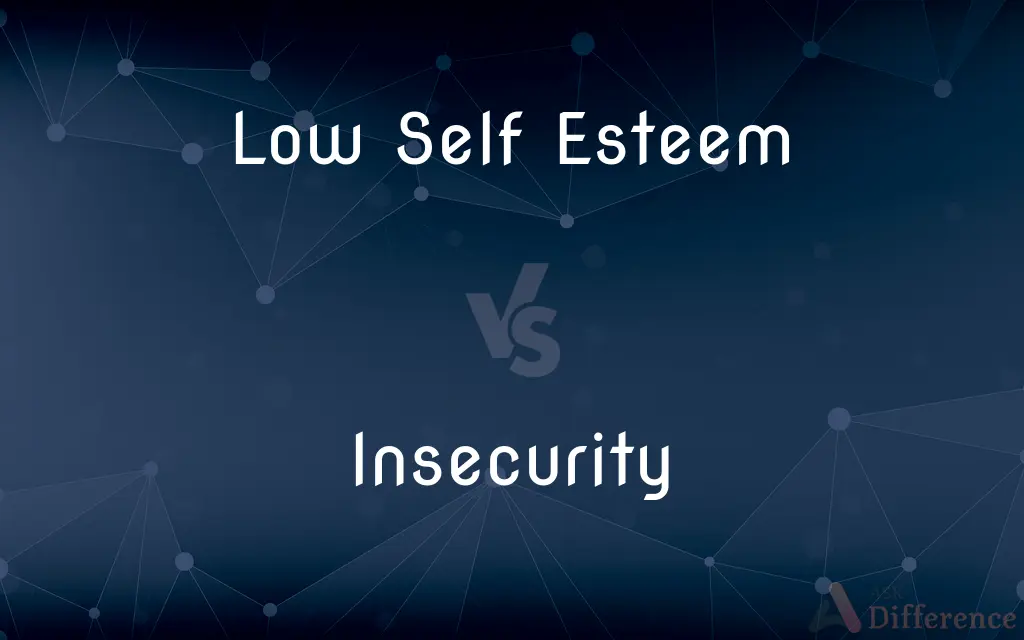Low Self Esteem vs. Insecurity — What's the Difference?
Edited by Tayyaba Rehman — By Fiza Rafique — Published on December 30, 2023
Low Self Esteem is a personal feeling of inadequacy or unworthiness, while Insecurity encompasses broader doubts about one's abilities or place in social contexts.

Difference Between Low Self Esteem and Insecurity
Table of Contents
ADVERTISEMENT
Key Differences
Low Self Esteem primarily pertains to an individual's perception of themselves in terms of worth or value. It is an intrinsic sense that one may not measure up, lacks importance, or doesn't have much to offer. On the other hand, Insecurity can manifest in numerous ways, including concerns about one's abilities, relationships, and appearance.
Low Self Esteem can manifest due to various reasons including past experiences, trauma, or persistent negative feedback. Individuals with low self-esteem often harbor critical views of themselves. Conversely, Insecurity is not just limited to self-worth. Someone might feel secure in their talents but still be insecure about their appearance or their relationships.
It's important to understand that while Low Self Esteem is a subset of Insecurity, not everyone with insecurities necessarily has low self-esteem. For instance, a top performer in an organization might still feel insecure about job stability, even if they feel valued and competent in their role. This is distinct from Low Self Esteem where one's foundational belief about their worth is negative.
Both Low Self Esteem and Insecurity can lead to defensive behaviors, anxiety, or overcompensation. While Low Self Esteem is a consistent undervaluing of oneself, Insecurity can be situational or targeted to specific facets of one's life.
Understanding both Low Self Esteem and Insecurity is crucial for personal growth. Addressing the root causes can lead to a healthier self-perception and improved interactions with others. While they are related concepts, they have distinct characteristics and impacts on an individual's life.
ADVERTISEMENT
Comparison Chart
Focus
Personal sense of worth and value.
Broad doubts about abilities, appearance, or status.
Origin
Past experiences, trauma, negative feedback.
Situational or specific concerns in various areas.
Manifestation
Persistent self-devaluation.
Can be fleeting or targeted to specific situations.
Relation to Others
Often an internal perception about oneself.
Can be influenced by external comparisons.
Impact on Behavior
Defensive behaviors, withdrawal, or self-sabotage.
Defensive, anxious, or overcompensating actions.
Compare with Definitions
Low Self Esteem
A belief that one is not good enough.
Sarah's low self esteem prevented her from voicing her opinions at the meeting.
Insecurity
A feeling of uncertainty or anxiety about oneself.
His insecurity was evident when he kept asking for validation.
Low Self Esteem
A feeling of unworthiness or inadequacy.
Low self esteem stopped Tom from pursuing his dream job.
Insecurity
A lack of confidence in one's abilities or qualities.
Despite her talents, Lisa's insecurity made her hesitant to lead.
Low Self Esteem
A lack of self-respect and self-worth.
Emma's low self esteem made her susceptible to negative influences.
Insecurity
Feeling threatened or unstable in a situation.
Being the newest member of the team heightened her insecurity.
Low Self Esteem
A negative self-assessment irrespective of achievements.
Winning the award did little to boost Mia's low self esteem.
Insecurity
Doubt or fear about one's position or standing.
The new office environment fueled Mike's insecurities.
Low Self Esteem
A consistent undervaluing of oneself.
Despite accolades, Jake's low self esteem made him doubt his abilities.
Insecurity
Concern about being compared or judged.
Peter's insecurity grew when he compared himself to others.
Insecurity
Not sure or certain; doubtful
Unemployed and facing an insecure future.
Insecurity
Inadequately guarded or protected; unsafe
A shortage of military police made the air base insecure.
Insecurity
Not firm or fixed; unsteady
An insecure foothold.
Insecurity
Lacking stability; troubled
An insecure relationship.
Insecurity
Lacking self-confidence; plagued by anxiety
Had always felt insecure at parties.
Insecurity
A lack of security; uncertainty.
Insecurity
A lack of confidence in oneself; self-doubt.
Insecurity
The state of being subject to danger; vulnerability.
Insecurity
The condition or quality of being insecure; lack of safety; danger; hazard; as, the insecurity of a building liable to fire; insecurity of a debt.
Insecurity
The state of feeling insecure; uncertainty; lack of confidence.
With what insecurity of truth we ascribe effects . . . unto arbitrary calculations.
A time of insecurity, when interests of all sorts become objects of speculation.
Insecurity
The state of being subject to danger or injury
Insecurity
The anxiety you experience when you feel vulnerable and insecure
Common Curiosities
Can you have insecurities without having Low Self Esteem?
Yes, one can feel insecure in certain areas or situations without undervaluing their overall self-worth.
What is the primary focus of Low Self Esteem?
It centers on a personal sense of worth and value.
Is Insecurity always a negative trait?
While often perceived negatively, it's a natural feeling, and addressing it can lead to personal growth.
Does Low Self Esteem always result from negative experiences?
While negative experiences can contribute, Low Self Esteem can arise from various sources, including internal perceptions.
How is Insecurity different from Low Self Esteem?
Insecurity encompasses broader doubts about abilities, appearance, or status, while Low Self Esteem is about one's sense of self-worth.
Is Insecurity only about self-perception?
No, it can relate to perceptions about one's standing compared to others or situational dynamics.
Can accomplishments and accolades overcome Low Self Esteem?
Achievements can help, but deeply-rooted Low Self Esteem may persist despite external validations.
What's a key difference between the two?
Low Self Esteem is a consistent undervaluing of oneself, whereas Insecurity can be situational or specific to areas of one's life.
How can Low Self Esteem impact relationships?
It can lead to defensive behaviors, withdrawal, or overcompensation, affecting interpersonal dynamics.
What might trigger Insecurity in a person?
Situational factors, comparisons, specific events, or perceived judgments can trigger it.
What is a common behavior for those with Insecurity?
Seeking validation, overcompensation, or avoiding certain situations are common behaviors.
Do Low Self Esteem and Insecurity always co-exist?
While they can co-exist, they don't always. One can have one without the other.
How does society influence Low Self Esteem and Insecurity?
Societal standards, comparisons, peer pressures, and cultural norms can influence both.
Can positive affirmations help combat Low Self Esteem?
They can help, but deeply-rooted issues might require more comprehensive interventions.
Can Low Self Esteem be improved?
Yes, through therapy, self-awareness, positive reinforcements, and other personal growth measures.
Share Your Discovery

Previous Comparison
Noodles vs. Spaghetti
Next Comparison
Chloroform vs. Carbon TetrachlorideAuthor Spotlight
Written by
Fiza RafiqueFiza Rafique is a skilled content writer at AskDifference.com, where she meticulously refines and enhances written pieces. Drawing from her vast editorial expertise, Fiza ensures clarity, accuracy, and precision in every article. Passionate about language, she continually seeks to elevate the quality of content for readers worldwide.
Edited by
Tayyaba RehmanTayyaba Rehman is a distinguished writer, currently serving as a primary contributor to askdifference.com. As a researcher in semantics and etymology, Tayyaba's passion for the complexity of languages and their distinctions has found a perfect home on the platform. Tayyaba delves into the intricacies of language, distinguishing between commonly confused words and phrases, thereby providing clarity for readers worldwide.












































